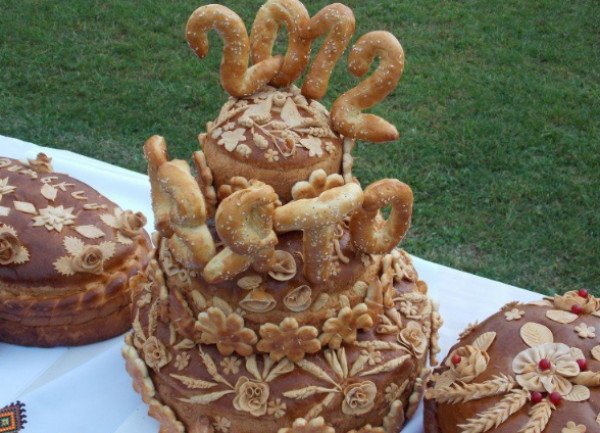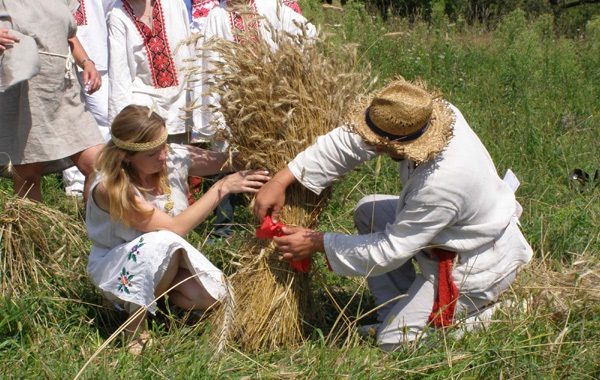Harvest rituals
Harvest rituals [врожайні обряди; vrozhaini obriady]. Folk rituals dating back to ancient times and marking the opening and closing of the harvest period. These ceremonies were characterized by a sequence of magical rituals that interacted with natural processes and phenomena. The spiritualization of nature was at the essence of these rites, which could influence critically the fate of the harvest.
Zazhynky marked the commencement of harvesting and took place at the end of June or the beginning of July. In the morning, all the reapers went into the fields together. The master or village elder took off his hat, turned to the sun, and uttered a special incantation requesting the fields to surrender their harvest and to give the reapers sufficient strength with which to gather it in. In more recent times, the incantation was replaced with a prayer. Then, the mistress or a woman reputed to be lucky (called postadnytsia in some regions) cut the first sheaf of grain, which was called voievoda. Women reapers rolled around on a cleared patch of the field with the purpose of absorbing strength from the soil. The postadnytsia presented the master with the first sheaf after which he offered everyone liquor and food. In the evening, the voievoda sheaf was brought to the master's house and was placed in the icon corner where it was to stand until the end of the harvesting.
Obzhynky marked the end of the harvesting, usually at the end of July or the beginning of August. After the last clutch of grain had been cut, a solemn procession around the field took place. A clump of unreaped wheat or rye left at the edge of the field was tied into a sheaf known alternatively as ‘Volos's beard,’ ‘Elijah's beard,’ ‘the Savior's beard,’ ‘Grandfather's beard,’ ‘goat,’ or simply ‘beard’ and was left as an offering to the gods of the fields. In some regions the ‘beard’ was thought to contain the benevolent spirits of ancestors who would protect the fields. Thereafter the reapers walked in a procession from the fields to the master's house, carrying the last sheaf (ostalets). The sheaf was then presented to the master and mistress accompanied with wishes of happiness and abundance. The master carried the ceremonial gift into the house and placed it in the icon corner. A harvest feast ensued, whereupon everyone was treated to drinks and food in the house or yard. These rituals, which are very similar to wedding rituals, were accompanied with special songs (see Harvest songs). Some elements of the obzhynky rituals have been revived in ‘harvest feasts’ that are held in Soviet Ukraine; eg, grain garlands were carried in procession and presented to chairmen of artels or collective farms. This ceremony was followed by dancing, singing, games, or sports competitions.
BIBLIOGRAPHY
Koperzhyns’kyi, K. Obzhynky: Obriady zboru vrozhaiu u slov'ians’kykh narodiv novoï doby rozvytku (Odesa 1926)
Krut’, Iu. Khliborobs’ka obriadova poeziia slov'ian (Kyiv 1973)
Bohdan Kravtsiv, Mykola Mushynka
[This article originally appeared in the Encyclopedia of Ukraine, vol. 2 (1988).]

